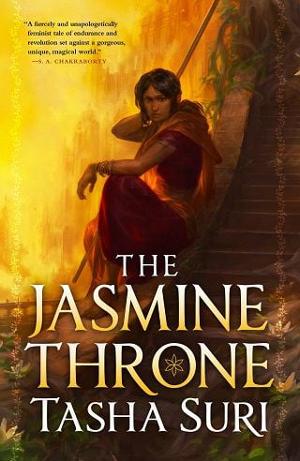Chapter 23: Ashok
ASHOK
He always wore a spare vial of the waters around his throat. He touched it now, as they slipped through the forest, the smell of blood in their nostrils, caked in their clothes and their nails. Kritika turned back to look at him for a brief moment. There was a smear of darkness across her cheek.
“Keep moving,” he said.
The vial was not hot, not burning with power the way sacred trees burned. But something felt—strange. Within the deathless waters in his blood. Within his skull.
Around him were his fellow rebels, winding through the forest with the familiarity of people born to it. A few wielded long-handled scythes and were clearing the way ahead of the rest of them. This was undisturbed land, untainted by the presence of empire, not even populated by Ahiranyi settlements. There were no shrines to the yaksa, hung in the branches or nailed to the vast trunks of the trees around them. It was no one’s territory, and therefore ideal. They needed somewhere to hide. And rest.
They had hit the imperial regime with a strong blow. That was only right, only fair, after what the regent had taken from them. Parijatdvipa wanted to use fear, turning faith into a blade? Then so would Ahiranya.
There was a noise ahead. A thump. The others stopped, and Ashok gritted his teeth and strode forward. Just like the rest of them, he knew the sound of a falling body when he heard it.
Sarita lay still where she’d collapsed, in a heap of bloodstained clothes and red-brown fingers, her scythe fallen at her side. Even standing above her, Ashok could see that her skin was wet.
When the vial waters were first consumed they brought on an intense rise in physical strength, along with some of the waters’ magic. But as the influence of the waters faded, the body would begin to tremble, terribly weakened. After a short time, water and blood together would begin to leave the body, pouring out of the mouth, the ears, the eyes. That was the way a poisoned death began.
This one had taken Sarita fast.
She had drunk two vials, or three, in the time she’d served the rebellion, always struggling to hold at bay the death it brought. She had fought with ferocity in the old lord’s haveli—broken a neck or four with nothing but the sheer force of her own strength holding those men still under her hands. And now she was dying. But a little more water would give her time. A little more—
A hand closed around his wrist. Kritika stood at his side.
“You have barely any left,” she said in a low voice, so as not to be heard by the others around them. “Three or four vials at most, and who knows when you’ll next be able to replenish your supplies? Please, Ashok. Don’t do this.”
He paused, his hand still on the vial in his pocket, ready to pull it free. Then he released it and kneeled down, placing that same palm gently against Sarita’s forehead.
“Sarita,” he said gently. “Brave woman. You’ve done so well.”
Her eyes opened, just a little. All whites, the pupils a pinprick of dark, like two bloodied wounds welling up beneath the point of a needle.
“Sarita. Sarita.” He repeated her name like a lullaby. His heart bled inside him at the sight of her. What a waste. “Does it hurt?”
Her mouth shaped a word, soundless. Yes.
“Kritika,” he said. “Will you…”
“Yes,” she told him, sadly. She gripped his shoulders, urging him up. “It will be done.”
He stood and walked away.
He heard the scythe being lifted. A snap. Then nothing.
In the silence of the moment, with nothing to disturb him but the sounds of mortal breaths around him, the hum of insects and the call of birds among the trees, he finally understood what had disturbed him so. What called in his blood.
There was a voice in the sangam crying out his name.
He walked a little farther, until he found a tree old enough and large enough to lean against. It cradled him.
The follower closest to him saw him sit and nodded gravely. Ashok knew, without further confirmation, that no one would disturb him now, unless the general’s soldiers found them. And that he considered unlikely.
He closed his eyes. Breathed. Breathed.
His sister had howled for him in the sangam, and he had come. She was a shadow kneeling in swift running water. She raised her head the moment he appeared.
“What did you do?” she asked him instantly.
“You saw the flames, then.”
“Of course I did. Ashok. Why?”
“Justice,” he said simply. “You think there shouldn’t be consequences for burning women alive and crushing men’s skulls? Come on now, Priya.”
“Did you kill General Vikram?”
That question stopped him short.
“Do you really care?”
“I care because of what his death would mean,” she bit out.
“I see. You care because of Bhumika.” He drew closer to her. “No. I didn’t kill him. I did consider it,” he confessed, thinking of the regent’s terrified face with no small pleasure. “But some things are not meant to be. I settled for Lord Iskar and his family instead.”
“Ashok.”
“The deaths of our people had to be repaid,” he said calmly. She was still so naïve. She didn’t understand the way the world worked, or the price power demanded. Not as he did. “And now they have been. Lord Iskar served the regent ably, didn’t he? A great financial mind. Without him, Vikram will never be able to bring the other lords to heel. No one will know how to get anything done. Maybe when they’re all bickering as their revenue streams crumble around them, they will remember that the Ahiranyi spirit isn’t to be trifled with.”
“You’re escalating,” said Priya. “You’re going to make everything so much worse. The general is going to kill so many people to compensate for this, Ashok.”
“He was the one who escalated,” Ashok said. “All those men and women put to death for—what? An ‘attack’ in which no one died but Meena? Your regent is a fool, or his master is a fool. The emperor needs to understand that they can’t take our language, ban our stories, let us starve, and then outright kill us, without consequences. I don’t regret it, Priya. And neither should you.”
“You’ll see Ahiranya bathed in blood, between you.” She sounded so much like Bhumika then—so disapproving and prim—that he could have laughed.
Instead, he kneeled down, mirroring her.
“Have you found the way to the deathless waters, Pri? If you really want things to be less bloody, that’s what you need to do.”
“If you’re going to lie to me, at least do me the service of making it convincing,” Priya scoffed. “If I give you the deathless waters you’ll use them to build an army, to murder, to—”
“—live,” he finished. “I need the deathless waters to live.”
The blow struck, as he knew it would. He could hear it in the weight of her silence.
“It’s like you’re holding a knife to your own throat to make me obey,” she said finally. “Everything you say feels like a threat.”
“The truth isn’t a threat,” he said gently. “Pri, I never wanted this for you. I set Meena on this task for a purpose. But you’re my only hope now. And I’m not lying. It will be less bloody, if my followers and I have the kind of strength we need to make a strike that snaps Parijatdvipa’s control of Ahiranya at the joints.”
In truth, they needed the waters if they wanted to be sure of success. He had plans. He knew exactly who needed to die to bring Parijatdvipa’s imperial power to its knees. He’d spent a long time considering. Every murder he and his followers made was intended to weaken Parijatdvipa’s control and pluck the weeds of imperial power out at their deepest roots. “You know what they say: in killing, a single blow of a scythe is cleaner than a dozen from the mace.”
With the deathless waters they could be the scythe: stronger than their limited numbers and cobbled together, disparate funds would allow. They could kill accurately and swiftly, cleansing Ahiranya in one fell swoop.
Without the waters, there was little chance of success. They would have to be brutal. They would have to burn and gut Ahiranya, killing their own in order to destroy the empire. There would be no clean plucking of weeds: This would be the kind of war that set whole fields of crops alight, leaving nothing but ash and hunger in its wake. And even then—even after paying in Ahiranyi blood—there would be no guarantee of success. No promise that Ahiranya would be free.
Only Priya could find the waters. Only Priya could coax the way from the Hirana, and bring Ashok and his followers the strength they needed to succeed. Only her.
Priya reached for him, then paused. She drew her hand back reluctantly. Lowered it into the confluence of waters.
“I’m not sure I can give you what you need,” she said finally. There was something vulnerable—almost a question—in her voice. “I’m not sure I can give you the waters. And I’m not sure I can give them to myself either.”
“You agree with Bhumika now, then? You want to bow and scrape before the Parijati for what little they deign to give us? You no longer want us to have what is ours by right?”
“What will you do with that right, Ashok? What are you doing?” she demanded. “What are we meant to be?”
“We could do so much good, Priya,” he told her sincerely. “The thrice-born could manipulate the rot, you know. It was so new then—as were we—but they could control it. You may not like my methods. You don’t have to. But once we rule Ahiranya, we can make our country better. We can see our people put first, fed and cared for as a priority, for once. We can save our culture, our history. Perhaps even end the rot entirely.”
“By becoming monsters?” Priya whispered. “By turning into weapons?”
Yes.
“You’ve killed too,” he said. “There’s no shame in being strong enough to take what is rightfully yours.”
“Maybe there should be,” she said. Another hesitation. Then the words unfurled out of her. “I remember more. The Hirana is beginning to respond to me. Sometimes I smell smoke and it’s as if it’s choking me. I hear screams. I…”
She looked at him, this shadow of her, who was only beginning to remember what he could never forget. “Ashok, can you promise me you won’t… that you’ll only do as much as you need to do, to see Ahiranya free? That you won’t kill every Parijati on our land? I know your anger,” she told him. “I feel it. And your grief. And your—hunger for something better. But can you promise me you won’t drown Ahiranya in blood?”
“I promise to do what is best for Ahiranya.”
“That isn’t an answer,” she said.
“I promise to make us what we once were.”
“That still isn’t an answer,” Priya whispered. “Ashok. Brother. You cannot be trusted with the kind of power we once had.”
Her words were like a slow knife, paring the skin from his ribs.
“I raised you,” he managed to say around the pain of her condemnation.
“I know.”
“When we were hungry, when we had nothing, I gave you what little food we had. I stayed up with a dagger in my hand when you slept on the street so you wouldn’t be harmed. In the Hirana I saved your life.”
“I know,” she choked out. “Ashok. I know.”
But she said nothing more.
He thought of waking in the husk of the tree, knowing that Meena was dead. Knowing that his own weakness had left the rebellion without a spy, without a valuable weapon in its hands.
He had not cultivated Priya into a weapon. He had let her go to Bhumika. And this was how she thanked him?
“There is so much you don’t remember of our childhood, Priya. But do you remember how we were trained when we were children?”
Silence. Then she said, “I remember pain.”
“It was how we were taught to be strong. How we were all taught to be strong enough to survive, and to rule. Pain can be a loving teacher. Spirits know I’ve had my fill of it.”
But you, he thought. Have you?
She was too weak, his sister. Too unaware of what she should have been.
“Do you know why we are nothing but shadows in the sangam?” he asked her then. “Have you ever questioned it?”
“No,” she said.
“Some of us who were older—we spoke of it. All our gifts are a reflection of the powers the yaksa possessed. Even this. It was the yaksa who traveled the cosmic rivers, once, and came to our world. When we come here, I believe it’s only the yaksa part of us that moves.” He curled his hand to a fist, placing it against her collarbone, above her heart. “When you taste the deathless waters, they carve out a place for the gifts of the yaksa inside you. The power of the yaksa is a cuckoo in the nest of your body. But worse still, you convince yourself it is you. It’s only when the power fades that you realize a part of you has been erased.”
“You’re not making any sense,” she told him. But she was listening.
“The part of you that stands here is the part of you that isn’t human,” he told her. “The part of you that stands here is the part the deathless waters carved out, gutted and hollowed to make a space for power.
“You don’t feel it day in and day out, but I do. Every time I drink the waters a new part of me is torn away.” He steeled himself to do what was necessary. To teach her. “You want to know what we are, Priya? Here. Let me show you.”
She realized a moment too late. Once, she would have known far more quickly—would have dodged or run or used her teeth. Life in the mahal had left her slow. But as it was, she could do nothing, before the shadow of his fist forced itself into her chest, the dark smoke of her unspooling.
He tightened his fist, close around where her heart should have been. And tightened, and twisted.
She screamed, the shadow of her a shimmer of agony.
“I know that it hurts,” he said roughly. “I know. This is how I feel all the time. Scoured and twisted and—inhuman, Priya. This is our inheritance.”
Like a hole through the heart, he thought. Like your soul is a decayed structure, crumbling, the light pouring through you.
There was something ugly and sweet about the feeling that ran through him in response to her pain. It was, he reasoned, the satisfaction of watching a lesson being learned.
“My will is stronger than yours, Pri. It always was. I saved your life time and time again, and now I tell you: Save mine. Your debt is due. Or you condemn me to die feeling like this.
“I want to make this ugliness in us worth something, Pri,” he told her. “I want us to use it for something greater. For something good. For Ahiranya as it should be, free of the empire. For our home.”
He wrenched his hand back. Darkness fell into the water from her shadowy form, bursting into black flowers before withering away. Her hands moved, fluttered, as if she wanted to touch her chest but didn’t dare.
“You could have been kinder,” she choked out. “You of all people, who suffered what I suffered—I thought I could trust you to be my brother.”
He shook his head.
“Family don’t have a duty to be kind to you. They have a duty to make you better. Stronger. I am being true to our family. Right now, Pri. And always.”
His voice became more tender.
“Find the deathless waters. Remember who you are and be strong, Priya.” And then, when she refused to look at him, when her head remained lowered, he said, “Priya. You had to know.”
He reached for her but she stumbled back from him—rejected him, with a savage noise that was not words, only feeling. She flung herself back into the water, unspooling into nothing. Running from him, and from the truth.
Distantly, he felt the flicker of Bhumika. Of one of his rebels, the scant few left who’d drunk the waters to fight at his side. He closed his eyes and lowered his own face beneath the rivers.
 Fullepub
Fullepub 



